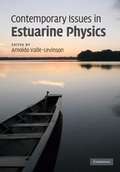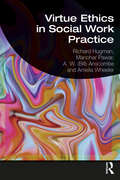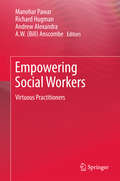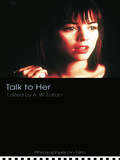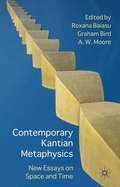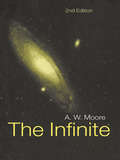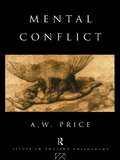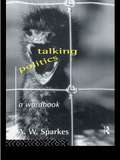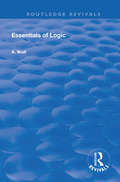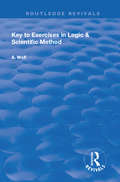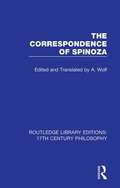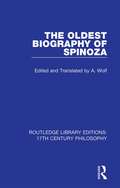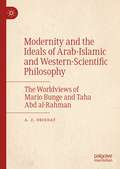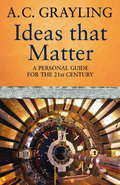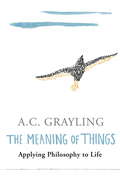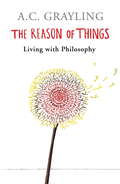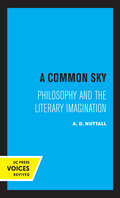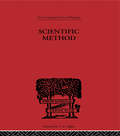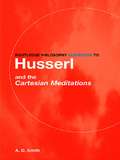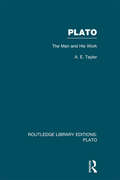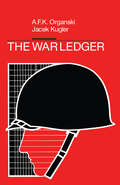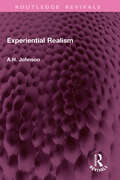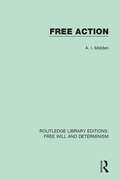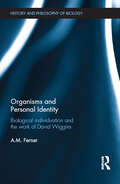- Table View
- List View
Contemporary Issues in Estuarine Physics
by A. Valle-LevinsonEstuaries are of high socioeconomic importance with 22 of the 32 largest cities in the world located on river estuaries. Estuaries bring together fluxes of fresh and saline water, as well as fluvial and marine sediments, and contain high biological diversity. Increasingly sophisticated field observation technology and numerical modeling have produced significant advances in our understanding of the physical properties of estuaries over the last decade. This book introduces a classification for estuaries before presenting the basic physics and hydrodynamics of estuarine circulation and the various factors that modify it in time and space. It then covers special topics at the forefront of research such as turbulence, fronts in estuaries and continental shelves, low inflow estuaries, and implications of estuarine transport for water quality. Written by leading authorities on estuarine and lagoon hydrodynamics, this volume provides a concise foundation for academic researchers, advanced students and coastal resource managers.
Virtue Ethics in Social Work Practice
by Manohar Pawar Richard Hugman A. W. Anscombe Amelia WheelerUsing evidence from research with practitioners, integrated with wider material about virtue ethics in the helping professions, this book explores important types of virtue that are central to developing and sustaining excellence in social work. Comprised of ten chapters and drawing on extensive research with social workers as well as wider debates and analysis, the discussion carefully concentrates on everyday experiences and achievements. This approach enables the book to avoid an idealized and prescriptive approach by making clear that virtues vary between contexts and individuals, while at the same time clearly marking out qualities and characteristics of social work that are foundational to the development of practitioners and of the profession as a whole. It will be required reading for students on all BSc/BSW and MSc/MSW courses on professional ethics or preparation for practice. It will also be of interest to practitioners in other professions, including human services, health, education and social development or development studies.
Empowering Social Workers
by Andrew Alexandra Manohar Pawar A. W. Bill Anscombe Richard HugmanThis book demonstrates the central role of ethical character in effective social work practice. Showcasing select biographies of social workers, it reveals how skilled practitioners have developed such core virtues as compassion, love, commitment, prudence, respect for human dignity and a critical sense of social justice through the course of their working lives, and how they apply these virtues in a wide variety of settings and situations to enhance the well-being of the people and communities they work with. As such, the book offers a powerful and inspiring resource to help educators, students and practitioners understand the unbreakable link between what social workers and other social welfare and social development professionals do and who they are, and thereby cultivate core qualities that should be promoted. "Pawar, Hugman, Alexandra and Anscombe have found a novel and creative way to explore virtues in social work by examining the career contributions of a group of social work practitioners engaged in 'virtuous action'. Their stories are inspiring and they provide much-needed role models for students and practitioners embarking on empowering practice" - Dr. Mel Gray, Professor of Social Work, The University of Newcastle. New South Wales, Australia. "In an age where the virtues of truth, cooperation and "doing the right thing" are increasingly being eroded in public life, this book serves as both an inspiration and invaluable resource to all social work practitioners seeking to reflect on, and improve their practice" - Dr. Martin Ryan, Social Worker, Counsellor/Community Educator, Jesuit Social Services, Melbourne. "The editors are to be commended for examining the virtuous characters of these ten professional social workers. The use of detailed biographies is an innovative and important approach which helps us to appreciate just what a tremendous impact the virtues can have. " - Dr. Christian B. Miller, A. C. Reid Professor of Philosophy, Director, The Character Project, Wake Forest University, USA.
Talk to Her (Philosophers on Film)
by A. W. EatonPedro Almodóvar is one of the most renowned film directors of recent years. Talk to Her is one of the most discussed and controversial of all his films. Dealing principally with the issue of rape, it also offers profound insights into the nature of love and friendship whilst raising important philosophical and moral questions in unsettling and often paradoxical ways. This is the first book to explore and address the philosophical aspects of Almodóvar’s film. Opening with a helpful introduction by Noël Carroll that places the film in context, specially commissioned chapters examine the following topics: The relationship between art and morality and the problem of 'immoralism' Moral injury and its role in the way we form moral judgments, including the ethics of love and friendship The nature of dialogue, sexual objectification and what 'listening to' means in the context of gender Almodóvar's use of allusion and the unmasking of appearances to explore hidden themes in human nature. Including a biography of Almodóvar, Talk to Her is essential reading for students interested in philosophy and film as well as ethics and gender. It is also provides an accessible and informative insight into philosophy for those in related disciplines such as film studies, literature and religion. Contributors: Noël Carroll, A. W. Eaton, Cynthia Freeland, Robert B. Pippin, C.D.C. Reeve, and George M. Wilson
Contemporary Kantian Metaphysics
by A. W. Moore Graham Bird Roxana BaiasuThis collectionresponds to two needs in the literature. First, the Kantian tradition of thought about space and time represents a rich philosophical resource, insufficiently explored in Anglo-American philosophy. The volume explores this resource. More precisely, it questions a basic assumption of a powerful trend in contemporary metaphysics: the assumption that reality is spatio-temporally organised independently of us. Kant's revolutionary contribution to metaphysics was likewise to question this assumption. The volume draws attention to Kant's distinctive approach to metaphysics and breaks new ground by radically broadening the scope of recent discussions on space and time, in particular by examining certain connections which metaphysics and science have to epistemic agency. Second, contemporary Kantian philosophy is currently pursued along two lines of thinking developed in Anglo-American literature and European philosophy. This work brings their distinct claims into a productive dialogue on topical issues such as action, perception, the body, and cognition and its limits.
The Evolution of Modern Metaphysics: Making Sense of Things
by A. W. MooreThis book is concerned with the history of metaphysics since Descartes. Taking as its definition of metaphysics 'the most general attempt to make sense of things', it charts the evolution of this enterprise through various competing conceptions of its possibility, scope and limits. The book is divided into three parts, dealing respectively with the early modern period, the late modern period in the analytic tradition and the late modern period in non-analytic traditions. In its unusually wide range, A. W. Moore's study refutes the tired old cliché that there is some unbridgeable gulf between analytic philosophy and philosophy of other kinds. It also advances its own distinctive and compelling conception of what metaphysics is and why it matters. Moore explores how metaphysics can help us to cope with continually changing demands on our humanity by making sense of things in ways that are radically new.
The Infinite
by A. W. MooreAnyone who has pondered the limitlessness of space and time, or the endlessness of numbers, or the perfection of God will recognize the special fascination of this question. Adrian Moore's historical study of the infinite covers all its aspects, from the mathematical to the mystical.
Mental Conflict (Issues in Ancient Philosophy)
by A. W. PriceAs earthquakes expose geological faults, so mental conflict reveals tendencies to rupture within the mind. Dissension is rife not only between people but also within them, for each of us is subject to a contrariety of desires, beliefs, motivations, aspirations. What image are we to form of ourselves that might best enable us to accept the reality of discord, or achieve the ideal of harmony?Greek philosophers offer us a variety of pictures and structures intended to capture the actual and the possible either within a reason that fails to be resolute, or within a split soul that houses a play of forces. Reflection upon them alerts us to the elusiveness at once of mental reality, and of the understanding by which we hope to capture and transform it. Studying in turn the treatments of Mental Conflict in Socrates, Plato, Aristotle and the Stoics, A.W. Price demonstrates how the arguments of the Greeks are still relevant to philosophical discussion today.
Talking Politics: A Wordbook
by A. W. SparkesTalking Politics is a philosophical examination of some of the basic concepts of political discourse. Its primary focus is on the ordinary; on what is said by politicians, in newspapers and by people in pubs, rather than on the works of political theorists. This is a work of, but not on political theory.Talking Politics is:* Invaluable as a source of reference for students, and contains a detailed index* Arranged thematically, around topics such as `Nation'. Each entry has copious cross-references and suggestions for further readingA. W. Sparkes is uniquely qualified to write such a book, combining some thirty years' teaching as a philosopher with wide experience of, and a life-long fascination with, politics. His attitude is that of a critical, but uncynical, observer.
Essentials of Logic (Routledge Revivals)
by A. WolfOriginally published in 1926, this book is an exploration of the essentials of logic: the study of the general conditions of valid inference. The main aim of logic is not to teach people to reason correctly, but to explain what happens when they do reason correctly, and why some reasoning is not correct, and this book contains chapters examining judgment and terms; categorical propositions and their implications; and deduction and syllogism.
Key to Exercises in Logic and Scientific Method (Routledge Revivals)
by A. WolfOriginally published in 1926, this book was written in the first instance for the benefit of those students of Logic and Scientific Method who receive insufficient or no help in the way of oral instruction. The main function of the following pages is to deal with the exercises, as distinguished from the book-questions. It includes chapters on the scope of logic, theory of judgment and immediate inference, and theory of induction.
The Correspondence of Spinoza (Routledge Library Editions: 17th Century Philosophy)
by A. WolfFirst published in 1928, The Correspondence of Spinoza is deeply interesting in many ways. It presents a pageant of the leading types of seventeenth-century mentality. It affords contemporary glimpses of important scientific researches and discoveries. It brings us into touch with some of the social and political events and tendencies of the period. This book includes correspondent letters containing things of first-rate importance for the correct interpretation of the philosophy of Spinoza.
The Oldest Biography of Spinoza (Routledge Library Editions: 17th Century Philosophy)
by A. WolfOriginally published in 1927, the publication of this volume may be regarded as a fitting contribution to the international celebrations in memory of one of the greatest of the sons of men. This biography is the oldest, and it is the only one written by one who knew Spinoza personally, and loved him well.
Modernity and the Ideals of Arab-Islamic and Western-Scientific Philosophy: The Worldviews of Mario Bunge and Taha Abd al-Rahman
by A. Z. ObiedatThis is the first study to compare the philosophical systems of secular scientific philosopher Mario Bunge (1919-2020), and Moroccan Islamic philosopher Taha Abd al-Rahman (b.1945). In their efforts to establish the philosophical underpinnings of an ideal modernity these two great thinkers speak to the same elements of the human condition, despite their opposing secular and religious worldviews. While the differences between Bunge’s critical-realist epistemology and materialist ontology on the one hand, and Taha’s spiritualist ontology and revelational-mystical epistemology on the other, are fundamental, there is remarkable common ground between their scientific and Islamic versions of humanism. Both call for an ethics of prosperity combined with social justice, and both criticize postmodernism and religious conservatism. The aspiration of this book is to serve as a model for future dialogue between holders of Western and Islamic worldviews, in mutual pursuit of modernity’s best-case scenario.
Ideas That Matter: A Personal Guide for the 21st Century
by A.C. GraylingLeading philosopher's guide to the ideas that will shape the 21st century'Ideas are the cogs that drive history, and understanding them is half way to being aboard that powerful juggernaut rather than under its wheels'. This is a book that celebrates the power of ideas: thought can, and does, change the world. And, in turn, ideas evolve. Fundamentalism, environmentalism and bioethics are defining our future just as Marxism, feminism or existentialism have influenced our present. So what do we need to know as we move into the 21st century? More than a simple reference work, this is A.C. Grayling's personal and heartfelt guide to the ideas, past and present, that shape our world. Covering religion, philosophy, scientific theory and political movements, each alphabetically ordered entry illuminates, elucidates and provokes. Written with Grayling's customary fire and erudition, the result is a book that aims both to arm readers with knowledge and engage them in philosophical debate.
The Meaning of Things: Applying Philosophy to life
by A.C. GraylingA refreshing distillation of insights into the human condition, by one of the best-known and most popular philosophers in the UK.Thinking about life, what it means and what it holds in store does not have to be a despondent experience, but rather can be enlightening and uplifting. A life truly worth living is one that is informed and considered so a degree of philosophical insight into the inevitabilities of the human condition is inherently important and such an approach will help us to deal with real personal dilemmas.This book is an accessible, lively and thought-provoking series of linked commentaries, based on A. C. Grayling's 'The Last Word' column in the GUARDIAN. Its aim is not to persuade readers to accept one particular philosophical point of view or theory, but to help us consider the wonderful range of insights which can be drawn from an immeasurably rich history of philosophical thought.Concepts covered include courage, love, betrayal, ambition, cruelty, wisdom, passion, beauty and death. This will be a wonderfully stimulating read and act as an invaluable guide as to what is truly important in living life, whether facing success, failure, justice, wrong, love, loss or any of the other profound experience life throws out.
The Reason of Things: Living with Philosophy
by A.C. GraylingThe follow-up to THE MEANING OF THINGS which continues A.C. Grayling's philosophical journey through lifeThe most important question we can ask ourselves is: what kind of life is the best? This is the same as asking: How does one give meaning to one's life? How can one justify one's existence and make it worthwhile?How does one make experience valuable, and keep growing and learning in the process - and through this learning acquire a degree of understanding of oneself and the world? A civilised society is one which never ceases debating with itself about what human life should best be. Some would, with justice, say that if we want ours to be such a society we must all contribute to that discussion.This book is, with appropriate diffidence, such a contribution. It consists of a collection of Grayling's regular 'Last Word' columns in the Guardian. This time topics include Suicide, Deceit, Luxury, Profit, Marriage, Meat-eating, Liberty, Slavery, Protest, Guns and War.
A Common Sky: Philosophy and the Literary Imagination
by A.D. NuttallThis title is part of UC Press's Voices Revived program, which commemorates University of California Press’s mission to seek out and cultivate the brightest minds and give them voice, reach, and impact. Drawing on a backlist dating to 1893, Voices Revived makes high-quality, peer-reviewed scholarship accessible once again using print-on-demand technology. This title was originally published in 1974.
Scientific method: An Inquiry into the Character and Validity of Natural Laws (International Library of Philosophy)
by A.D. RitchieFirst published in 2000. Routledge is an imprint of Taylor & Francis, an informa company.
Routledge Philosophy GuideBook to Husserl and the Cartesian Meditations (Routledge Philosophy GuideBooks)
by A.D. SmithHusserl is one of the most important philosophers of the twentieth century and his contribution to the phenomenology movement is widely recognised. The Cartesian Meditations is his most famous, and most widely studied work. The book introduces and assesses: Husserl's life and background to the Cartesian Meditations, the ideas and text of the Cartesian Meditations and the continuing imporance of Husserl's work to Philosophy.
Plato: The Man And His Work (Routledge Library Editions: Plato)
by A.E. TaylorThis book provides an introduction to Plato’s work that gives a clear statement of what Plato has to say about the problems of thought and life. In particular, it tells the reader just what Plato says, and makes no attempt to force a system on the Platonic text or to trim Plato’s works to suit contemporary philosophical tastes. The author also gives an account that has historical fidelity - we cannot really understand the Republic or the Gorgias if we forget that the Athens of the conversations is meant to be the Athens of Nicias or Cleon, not the very different Athens of Plato’s own manhood. To understand Plato’s thought we must see it in the right historical perspective.
The War Ledger
by Jacek Kugler A.F.K. OrganskiThe War Ledger provides fresh, sophisticated answers to fundamental questions about major modern wars: Why do major wars begin? What accounts for victory or defeat in war? How do victory and defeat influence the recovery of the combatants? Are the rules governing conflict behavior between nations the same since the advent of the nuclear era? The authors find such well-known theories as the balance of power and collective security systems inadequate to explain how conflict erupts in the international system. Their rigorous empirical analysis proves that the power-transition theory, hinging on economic, social, and political growth, is more accurate; it is the differential rate of growth of the two most powerful nations in the system—the dominant nation and the challenger—that destabilizes all members and precipitates world wars. Predictions of who will win or lose a war, the authors find, depend not only on the power potential of a nation but on the capability of its political systems to mobilize its resources—the "political capacity indicator." After examining the aftermath of major conflicts, the authors identify national growth as the determining factor in a nation's recovery. With victory, national capabilities may increase or decrease; with defeat, losses can be enormous. Unexpectedly, however, in less than two decades, losers make up for their losses and all combatants find themselves where they would have been had no war occurred. Finally, the authors address the question of nuclear arsenals. They find that these arsenals do not make the difference that is usually assumed. Nuclear weapons have not changed the structure of power on which international politics rests. Nor does the behavior of participants in nuclear confrontation meet the expectations set out in deterrence theory.
Experiential Realism (Routledge Revivals)
by A.H. JohnsonExperiential Realism (1973) is the outline of a new philosophical system. It is an attempt to discuss the major ingredients found in the context of comprehensive human experience. This approach to mankind and its environment is descriptive rather than speculative. Since it is based on all the major aspects of human experience, it avoids the restrictive (and sometimes doctrinaire) approach to a few specific problems – a fault which mars much contemporary philosophy. This book considers in detail words, meaning, mind, physical objects, concepts, knowledge and values. It makes use of the many sound insights reported by philosophers, ancient, modern and contemporary, and indeed there is considerable kinship with A.N. Whitehead’s insights. It also offers an evaluation of representative philosophers in the context of comprehensive experience – thus placing Experiential Realism in perspective.
Free Action (Routledge Library Editions: Free Will and Determinism #3)
by A.I. MeldenThat a science of human conduct is possible, that what any man may do even in moments of the most sober and careful reflection can be understood and explained, has seemed to many a philosopher to cast doubt upon our common view that any human action can ever be said to be truly free. This book, first published in 1961, looks into crucially important issues that are often ignored in the familiar arguments for and against the possibility of free action. These issues are brought to light and examined in some detail.
Organisms and Personal Identity: Individuation and the Work of David Wiggins (History and Philosophy of Biology)
by A.M. FernerOver his philosophical career, David Wiggins has produced a body of work that, though varied and wide-ranging, stands as a coherent and carefully integrated whole. In this book Ferner examines Wiggins’ conceptualist-realism, his sortal theory ‘D’ and his human being theory in order to assess how far these elements of his systematic metaphysics connect. In addition to rectifying misinterpretations and analysing the relations between Wiggins’ works, Ferner reveals the importance of the philosophy of biology to Wiggins’ approach. This book elucidates the biological anti-reductionism present in Wiggins’ work and highlights how this stance stands as a productive alternative to emergentism. With an analysis of Wiggins’ construal of substances, specifically organisms, the book goes on to discuss how Wiggins brings together the concept of a person with the concept of a natural substance, or human being. An extensive introduction to the work of David Wiggins, as well as a contribution to the dialogue between personal identity theorists and philosophers of biology, this book will appeal to students and scholars working in the areas of philosophy, biology and the history of Anglophone metaphysics.
